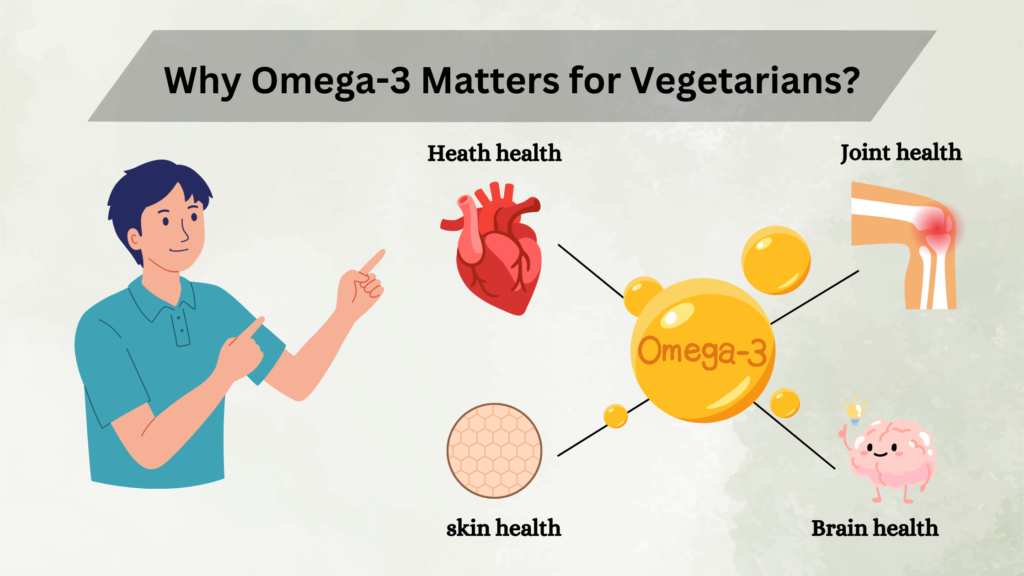What’s the first thought that comes to your mind after listening to the word Omega-3? Is it something related to fish? Being a non-vegetarian it’s easy to fulfill daily Omega-3 requirements but, if you are a vegetarian, you may often wonder whether you are getting enough Omega-3 in your diet. Omega-3 fatty acids are essential for brain health, heart function, and overall well-being.The lack of Omega-3 can lead to various health problems such as fatigue, dry skin, poor concentration, and joint pain. If you are feeling low on energy, it might be due to Omega-3 deficiency. Now, here’s the good news. There are plenty of vegetarian-friendly sources of Omega-3. This blog will help you explore the best Omega-3 for vegetarians source, deficiency signs, and how Omega-3 can benefit your health.
As we discussed above, many people believe that the best sources of Omega-3 come from fish. This can make it challenging for vegetarians to meet their daily Omega-3 needs.
What is Omega-3 and Why is it Important?
Omega-3 fatty acids are a type of essential fat that our body cannot produce on its own. What does it mean? This means we need to get them from our diet. Omega-3 is crucial for many bodily functions, including:
- Supporting brain health and cognitive function
- Reducing inflammation in the body
- Maintaining a healthy heart
- Supporting eye health
- Improving mood and mental well-being
How can you Identify Omega-3 Deficiency
Not getting enough Omega-3 can lead to several health issues. Some common signs of Omega-3 deficiency include:
- Dry and flaky skin
- Fatigue and low energy levels
- Poor concentration and memory problems
- Joint pain and stiffness
- Increased risk of heart disease
- Mood swings and depression
If you notice any of these symptoms, it may be time to add more Omega-3 for vegetarians source to your meals. Below we have curated a list of a few Omega-3-rich vegetarian sources that will help you meet your daily requirements.
Best Omega-3 Vegetarian Sources
1. Chia Seeds
Chia seeds are one of the best sources of plant-based Omega-3 and are also considered a powerhouse of nutrients. Just one tablespoon of chia seeds provides a significant amount of Omega-3.
2. Flaxseeds
Flaxseeds are another excellent source of Omega-3. These can be consumed by sprinkling on salads, mixing them into smoothies, or baking them into muffins.
3. Walnuts
People often consume walnuts early in the morning. These are not only delicious but also rich in Omega-3. Eating a handful of walnuts daily can help meet daily Omega-3 requirements.
4. Soybeans and Tofu
Soybeans and tofu are rich in Omega-3, making them an excellent option for vegetarians. There are lots of tasty dishes that can be prepared at home and you may consume them easily.
5. Algae
Algae is a rich, sustainable source of Omega-3 fatty acids, specifically DHA (docosahexaenoic acid) and EPA (eicosapentaenoic acid), which are essential for brain function, heart health, and reducing inflammation. Unlike fish oil, algae oil is vegan, eco-friendly, and free from ocean contaminants like mercury.
Health Benefits of Omega-3 Fatty Acids
Omega-3 fatty acids are healthy fats that have multiple health benefits. These essential fats support heart health and offer many other health benefits such as:
1. Supports Heart Health and Reduces Stroke Risk
Several studies show that Omega-3 fatty acids can help lower the risk of cardiovascular diseases and strokes. Taking about 850 mg of EPA and DHA daily, along with 300 mg of natural vitamin E, can help prevent heart disease. Omega-3 can also lower triglyceride levels, reduce blood clotting, and regulate heart rhythms.
2. Helps Prevent Coronary Artery Disease (CAD)
Omega-3 fatty acids found in fish oil help produce compounds like prostaglandins-3 and thromboxane-3, which prevent blood clots and improve circulation. This reduces the risk of clogged arteries and irregular heartbeats.
3. Lowers Blood Pressure
Omega-3 helps widen blood vessels, making it easier for blood to flow and reducing high blood pressure. However, in people without hypertension, Omega-3 do not significantly lower blood pressure.
4. Helps Ease Rheumatoid Arthritis Symptoms
Rheumatoid arthritis causes joint pain, swelling, and stiffness. Studies suggest that taking Omega-3 along with arthritis medications can help reduce pain and improve joint function.
5. Boosts Brain Health and Reduces Alzheimer’s Risk
Omega-3 fatty acids, especially DHA, are essential for brain function. They help improve memory and reduce the risk of Alzheimer’s disease by preventing the buildup of harmful plaques in the brain.
6. Protects Eye Health and Reduces Macular Degeneration Risk
Macular degeneration is one of the leading causes of vision loss. A diet rich in Omega-3 may lower the risk of developing this condition, though it may not reverse symptoms or prevent blindness entirely.
7. Helps Manage Blood Sugar Levels in Diabetes
Type 2 diabetes, which is common in overweight adults, can be managed with Omega-3. EPA fatty acids in fish oil help improve blood sugar control and overall health in diabetic patients.
8. Reduces Migraine Symptoms
Omega-3 contains EPA, which helps regulate prostaglandin levels and reduces serotonin secretion. This can lower platelet stickiness and improve blood flow in the brain, helping to ease migraine symptoms.
9. Helps with Asthma Symptoms
Omega-3 reduces leukotrienes, substances that cause inflammation in the lungs. Regular consumption of Omega-3-rich foods may help people with asthma breathe more easily.
10. Reduces Risk of Chronic Diseases
Omega-3 fatty acids have strong anti-inflammatory effects that may lower the risk of chronic diseases such as arthritis and certain types of cancer.
How to Include Omega-3 into Your Diet
Getting enough Omega-3 as a vegetarian is simple. You just have to make small changes in your diet. Here are some easy ways to include Omega-3 in your meals:
- Firstly, add chia seeds or flaxseeds to your smoothies, yogurt, or oatmeal.
- Snack on a handful of walnuts.
- Use hemp seeds in salads and soups.
- Cook with Omega-3-rich oils such as flaxseed oil or walnut oil.
- Consider taking algal oil supplements if you are not getting enough Omega-3 from food. You can search for a reputed brand that offers quality natural supplements such as Rasayanam which is a well-known brand that offers natural Omega-3 capsules.
Some Commonly Asked Questions About Omega-3 for Vegetarians
1. Is it possible for vegetarians to get Omega-3 from food alone?
If we talk about only food, then it may not be possible to get enough Omega 3. Therefore we need supplements.
2. Do I need an Omega-3 supplement if I am vegetarian?
If you are not getting enough Omega-3 from food, you may consider taking algal oil supplements. There are many brands in the market. You can check their authenticity and buy from them.
3. How much Omega-3 do I need daily?
It is recommended that adults consume about 1.1 to 1.6 grams of Omega-3 per day.
4. Are plant-based Omega-3 sources as good as fish sources?
Plant-based Omega-3 sources provide ALA (Alpha-linolenic acid), which the body converts into DHA and EPA, though at a lower rate. Algal oil is the best plant-based alternative to fish oil.
5. Can Omega-3 help with weight loss?
Omega-3 may support weight loss by improving metabolism and reducing inflammation.
Conclusion
Omega-3 is essential for overall health, and vegetarians can easily meet their needs with the right food choices. The foods have been discussed in the blog Including these foods in your diet can help prevent Omega-3 deficiency and provide numerous health benefits. If you struggle to get enough from food, Omega-3 supplements like Rasayanam Omega-3 capsules extracted from algal oil can be a great option.
Start adding more Omega-3-rich foods to your diet today and enjoy the benefits of a healthier life!
Reference link:





